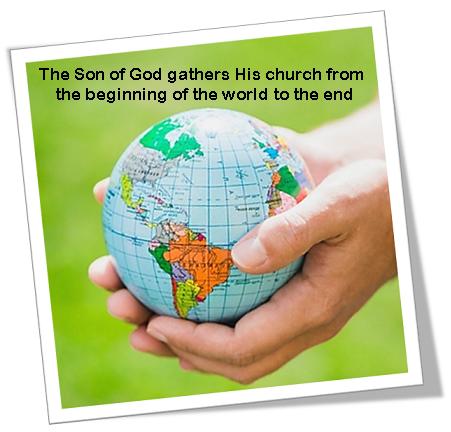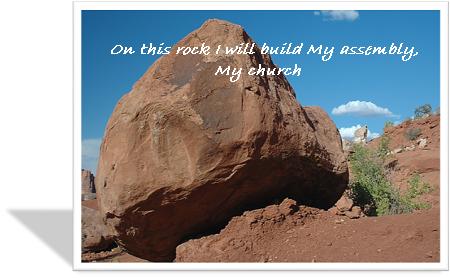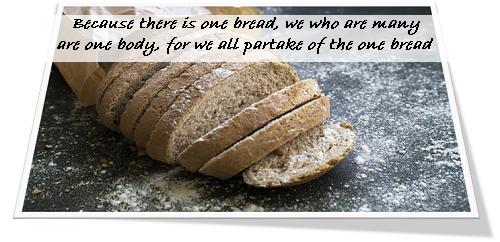The Doctrine of the Church in Holy Scripture
The Doctrine of the Church in Holy Scripture

Introduction⤒🔗
Brothers and sisters, I am glad to be in your midst tonight to speak about the topic of the doctrine of the church in Holy Scripture. You will understand that this is a broad topic. If we speak about the doctrine of the church we think of that doctrine as it has been confessed by the Catholic Church, for instance, in the Nicene Creed in which we say we believe "one holy catholic and apostolic church." Or think of our Heidelberg Catechism in Lord's Day 21 where we confess that ''the Son of God from the beginning of the world to its end gathers, defends and preserves for Himself … a church chosen to everlasting life." Or we think of the Belgic Confession Articles 27 (and following) in which is spoken about the catholic church as "a holy congregation and assembly of the true Christian believers who expect their entire salvation in Jesus Christ, are washed by His blood, and are sanctified and sealed by His Holy Spirit."
Now tonight we would like to see something of the scriptural background of the doctrine of the church as it has been confessed by the church of all ages. When we read the Scriptures about the church, there is a wealth of revelation of God concerning His work in gathering His church. But in order to systematize that contents of God's revelation I would like to take especially three expressions for the church, three indications of the nature of the church and I do so in a trinitarian manner. We speak about God the Father, God the Son and God the Holy Spirit. You may say that all the outgoing works of God are works of the Father, the Son and the Holy Spirit. Also the work of gathering the church. Now if we think of that doctrine of the trinity, the Father, the Son and the Holy Spirit, then I would say that Scripture reveals to us that the church is, in the first place, the assembly of the covenant people of God the Father. In the second place, you can say the church is the body of Christ, God the Son. And in the third place, the church is the temple of the Holy Spirit. I would like to take those three indications of the church as our guideline tonight.
The Assembly of the Covenant People of God the Father←⤒🔗
First then, I speak about the church in the Scriptures as the assembly of the covenant people of God the Father. When I indicate the church in such a manner, I think especially of the revelation of God right in the beginning of Holy Scripture. We confess that the Son of God gathers His church from the beginning of the world to the end. Therefore if we speak about the church we should not only speak about the church of God in the new dispensation but we should also think of the church of God in the old dispensation. Now in the Old Testament there are especially two nouns that are used as an indication of the church. Allow me first to mention those nouns in the Hebrew language. There is the word qãhãl and there is the word ẽdâ. That has been translated in the Revised Standard Version in this manner. When the Hebrew text has the Word qãhãl the RSV uses the word "assembly." When the Hebrew text has the word ẽdâ the RSV uses the word "congregation." Assembly and congregation.

In order to read some words of Scripture in which you find these indications, let us think of the very important moment that the LORD God called His people at Mount Sinai. In Exodus 19 when Israel comes to Mount Sinai God says to Israel "you shall be My own possession among all peoples … you shall be to Me a kingdom of priests and a holy nation," The LORD God established His covenant with Israel at the Sinai and gave the ten words of the covenant. In the book of Deuteronomy (5:22) Moses speaks about the ten words as the words that "the LORD spoke to all your assembly" and in Deuteronomy 9:10 and 10:4 he calls that "the day of the assembly." That was the day when there was the gathering of the congregation of Israel. Therefore that is called the day of the assembly. In the law of Moses in Deuteronomy 23 you will find a law about all those who enter the assembly of the LORD, Yahweh. The LORD God of the covenant is the convener of the assembly of the LORD and the assembly of the LORD is an Old Testament name for the church of God. It is the church that God brings together.
Now there are even passages in the Old Testament in which you find both expressions. I think, for instance, of Judges 20:1 where is spoken about the congregation assembled as one man to the LORD at Mizpah. A gathering of God's people at Mizpah is called the congregation – the congregation assembled. "The chiefs of all the people, of all the tribes of Israel, presented themselves in the assembly of the people of God" (v.2). So the people of God formed the congregation. That congregation comes together in the assembly and the assembly is called the assembly of the people of God. Also, in Numbers 14 when Israel sins against the LORD on the way through the desert, "Moses and Aaron fell on their faces before all the assembly of the congregation of the people of Israel" (v.5). There you have the broad name of the assembly of the congregation of the people of Israel. So in the Old Testament there are especially two words to indicate the church of God - the assembly and the congregation. The congregation is assembled as the people of God.
Now we may say that the expressions "the people of God" and "the assembly of the people of God" have in the Old Testament already a perspective to the New Testament. In the New Testament is again spoken about the people of God. But you know that all expressions of Exodus 19 are then as it were transmitted to the congregation of the New Testament. I think, for instance, of the way in which Paul speaks about the church of the New Testament as the Israel of God and the way in which Peter in his letter writes about the church as the chosen race. He says to the church called out of the Jews and Gentiles, "you are a chosen race, a royal priesthood, a holy nation, God's own people, that you may declare the wonderful deeds of Him who called you out of darkness into His marvellous light" (1 Peter 2:9). Or you can think of the way in which Peter in the meeting in Jerusalem in Acts 15 had said God has "visited the Gentiles to take out of them a people for His name" (v.14). So in the same manner as God took the people of Israel in the old dispensation as a people of His own possession so there is a people that God takes out of all tribes and nations in the new dispensation – a people for His name. The apostle Paul in his letter to the Romans, chapter 9 applies to that people of God out of the Jews and the Gentiles all the names that the prophets had given to God's people. Once no people but now God's people for God has gathered a people of His own that He calls His people – a holy nation, God's own possession.
And now we see that those two names, the assembly and the congregation of the covenant people of God are applied to the church of God in the New Testament. The two places where our Lord Jesus Christ speaks about His church in the gospels are Matthew 16 and 18. In Matthew 16 we read that Peter confesses that the Lord Jesus is the Christ, the Son of God. Then the Lord Jesus says you are Peter and on this rock I will build My assembly, My church. The Lord Jesus here uses the same word that is used in the Old Testament for the assembly of the people of God. Christ called that My church, My assembly. In Matthew 18 the Lord says that if a brother sins, you should admonish him first, but then if he does not listen tell it to the church, to the assembly. The Lord Jesus speaks about the New Testament people of God as assembled in a similar manner as the Old Testament people of God were assembled on the day of the assembly. So there is the assembly of the congregation of God. That word ekklesia that is used in the New Testament is found in the French word "église" for church. It is the assembly of the people of God.
In the days of the New Testament, that word ''assembly'' also had a political meaning in civil life. It was used for the gathering of the citizens of a Greek polis, a Greek city. In Acts 19 we read of the riot in Ephesus and there the word "assembly" is used for an assembly of the citizens of Ephesus. You see then that the word assembly was a word that was also used in civil life. But then it becomes in the New Testament – in the line of the Old Testament – the word for the assembly of the citizens of God's kingdom. You may say that the church is an assembly of those people who by the grace of God have become obedient citizens of God's kingdom.
These are thus some indications for that first thought that in Scripture the church is indicated as the assembly of the covenant people of God. And then we think especially of God the Father.

Therefore you may say that the confessions are right when the confessions speaking about the church stress that element of assembly. I think of the Belgic Confession in Article 27 where the church is an assembly, a congregation. We should not build up the indication of the church of God from the individual. We should build up the confession about the church of God from the assembly of the people of God.
Another element if we think about the significance of the church as the assembly of the people of God is that we never should make a contrast between the so-called clergy and the so-called laity. For the word laity comes from the Greek word for people. The laity are those who belong to the people of God. But, all ministers, elders, deacons also belong to the people of God. So precisely the concept of the church as the assembly of the covenant people of God is devoid of any hierarchical concept. It cuts off all ideas of a contrast between clergy and laity. Now I want to continue by speaking about that second element, namely, that the church is called in Scripture the body of Christ. Then we think of God the Son.
The Body of Christ←⤒🔗
If we first of all make a survey of the texts in which the church is called the body of Christ in Scripture, I think of three texts from 1 Corinthians, one text from Romans, four from Colossians and five from Ephesians.
In Paul's letter to the Corinthians in 1 Corinthians 8:15 Paul writes: "Do you not know that your bodies are members of Christ?" And then in chapter 10 he speaks about "a participation in the body of Christ" at the Lord's Supper. "Because there is one bread, we who are many are one body, for we all partake of the one bread." And then in chapter 12 he writes broadly about the image of the congregation as the body of Christ. "Just as the body is one and has many members, and all the members of the body, though many, are one body so it is with Christ. For by one Spirit we were all baptized into one body" (vv.12f.).
In the letter to the Corinthians the image of the congregation as a body is used in order to indicate that all members are members of the one and the same body and that they should use their gifts and talents joyfully and cheerfully for the well-being of the other members. I think that in the first letter of the Corinthians Paul, in using that image of body, is thinking of the body as an organism. In his usage of the image of the congregation as the body of Christ he does not first of all think of the relationship between Christ as the head and us as members of His body. Rather, he thinks of the mutual relationship of the members of the body. For in 1 Corinthians 12 he says the head cannot say to the other members I do not need you. Then he does not mean there the head Christ but he simply uses the image of the body as an organism in which all the members work together.
In Romans 12:4,5 he says: "For as in one body we have many members, and all the members do not have the same function, so we, though many, are one body in Christ, and individually members one of another." We are one body in Christ. He does not speak there of the body of Christ but he speaks of being one body in Christ.
In the letters of Paul to the Ephesians and to the Colossians you get the deepest revelation about the congregation as body, for there Paul speaks about Christ as the head and he says: "He is the head of the body, the church: He is the beginning, the first-born from the dead, that in everything He might be pre-eminent," Colossians 1:18. Or you can say with Ephesians 1:22,23 God has made Him, Christ, "the head over all things for the church which is His body." The church is the body of Christ. But you know that Paul then in chapter 5:23 speaks about Christ as the head of the church His body. He also writes: "The whole body, joined and knit together … makes bodily growth and upbuilds itself in love," Ephesians 4:16.

That is, shortly summarized, the revelation of God about the church as the body of Christ or as a body in Christ. If we think about the significance of that image, then we must say that we should never use the idea of the church as the body of Christ in order to speak about the church as a mystical supra-temporal phenomenon. There have been Christian thinkers who have used the concept of the church as the body of Christ to say that it is something that is above this earth and above this reality above this life and time, that it is a supra-temporal mystical body of Christ. But when Paul uses that illustration of the church as the body of Christ, Paul first of all very simply thinks of that congregation, for instance of Corinth, that congregation with all its faults and mistakes which nevertheless was a church of God, an assembly of the covenant people of God. Paul indicates that in that concrete congregation the members should know of the privilege and of the responsibility of being members of one and the same body. We should not make that something invisible. Sure there are invisible aspects of the church, also of the church as the body of Christ, that communion, that fellowship with the Lord Jesus Christ as worked by the Holy Spirit. And I can only speak in faith about the church as the body of Christ. But, this speaking in faith does not make that reality a reality which is not of this world.
Now it is the grace of God that He calls His people through His Word and Spirit and that He makes a congregation a body of Christ. But you will understand that that image of the body of Christ is precisely used in Scripture in order to admonish us to function as a living member of that body, that I am a living member as our Heidelberg Catechism puts it (L.D. 21). The catechism also speaks about the communion of saints that should be exercised within the congregation of God. Now we come to the third indication of the nature of the church. You may say that that third indication is the indication of the church as the temple of the Holy Spirit.
The Temple of the Holy Spirit←⤒🔗
The church as the temple of the Holy Spirit is found especially in three passages of Scripture. You can think again of the first letter of Paul to the Corinthians. In 1 Corinthians 3 Paul speaks about the members of the congregation. He says: "Do you not know that you are God's temple and that God's Spirit dwells in you? If anyone destroys God's temple, God will destroy him. For God's temple is holy, and that temple you are" (vv.16ff). In the same manner as God dwelt in the Old Testament temple in Jerusalem, so by the grace of the Lord Jesus Christ, God is pleased to dwell in the congregation. He dwells in the congregations through His Spirit. The Spirit who proceeds from God the Father and from God the Son dwells in the church and makes the church into God's temple in which God is present.
And you can think of the way in which Paul in the second place writes to the Ephesians about the church. There Paul reminds his gentile readers that they were once alienated from the commonwealth of Israel (1:11-12) and later says, "you are no longer strangers and sojourners, but you are fellow citizens with the saints and members of the household of God, built upon the foundation of the apostles and prophets, Christ Jesus Himself being the cornerstone, in whom the whole structure is joined together and grows into a holy temple in the Lord; in whom you also are built into it for a dwelling place of God in the Spirit" (2:19-22). In Ephesians 2 Paul had used all kinds of expressions for the church – fellow citizens, members of the household of God; but, it culminates in that image of the church as a structure that grows into a holy temple in the Lord, a dwelling place of God in the Spirit. So it is the Holy Spirit who makes the church, who brings the church about through the preaching of the Word. The church is a Spirit-created reality in this world, a fruit of the Work of the Spirit of the Lord Jesus Christ poured out on the day of Pentecost. In the book of Acts we see how it is the Holy Spirit who through the preaching of the Word brings together the assembly of the congregation of God's covenant people; how it is the Holy Spirit who builds that body of Christ into a living organism.
The third passage is from Peter. The apostle Peter in 1 Peter 2:4-7 speaks about the believers who have not taken offence at Christ but are being built upon that cornerstone, Christ. Then Peter writes "you are a chosen race, a royal priesthood, a holy nation, God's own people." But in that same context he has said, "Like living stones be yourselves built into a spiritual house, to be a holy priesthood to offer spiritual sacrifices acceptable to God through Jesus Christ." That spiritual house in 1 Peter 2 is an indication of the church as a temple of God through the Holy Spirit. If we think about that revelation of God in Scripture that the church is a temple of the Holy Spirit then we should see the tremendous privilege that the people of God may form together a structure, a house that God is pleased to dwell in through His Spirit. That fact makes the gifts within the congregations, charismata, gifts of the Holy Spirit. Working together as members of one body is a using of the gifts of the Holy Spirit. The church is a creation of the Spirit of God.

Conclusion←⤒🔗
Well brothers and sisters those are three indications of the church of God in Scripture. I could speak about many more. The church is called the sheep, the flock of the Lord Jesus Christ. The church is called the bride of Christ the bridegroom. The church is called the branches of Christ, the vine. The church is called the new Jerusalem, or the Jerusalem that is above, that comes from above, which is the mother of us all (Galatians 4). But I took these three indications in order not to overload my introduction but to give a good basis for a discussion about the church of God in this world.
I may end by saying that in our confession there is a Scriptural summary of these data. And now I think especially also of the fact that the confession says that there can be hypocrites in the church of God. That is based on what Scripture says. The apostle John in his first letter says there can be people who are in the church but who are not of the church. And John says that they went out of us because they were not of us. So precisely because the church is that work of the triune God in this world, that work of grace, we should not take for granted that we are members of that church but we should be aware that we can only be living members of the church of God by faith in the Lord Jesus Christ. And we should also be aware of the fact that Scripture says that God knows those who are His. That is God's view of the church, the church in the sight of God. At the same time Scripture warns us that everyone of us should stay away from iniquity. That is our responsibility. Also in that light we should always speak about the church of God with awful reverence for God the Father, the Son and the Holy Spirit and with a deep feeling of our privilege but also of our responsibility with respect to God's church.

Add new comment